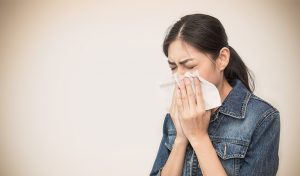As the name suggests, an allergy that occurs in a particular season is known as seasonal allergy. Hay fever (allergic rhinitis) is the most common seasonal allergy. However, there are some other allergies as well like skin & eye infections that you can get throughout the year. Different seasons bring different allergies and we know how you can keep them away with some simple steps. Firstly, let’s look at what causes these allergies.
Allergies occur when your immune system identifies a harmless substance as harmful, whether it’s general or seasonal allergies. One of the most common allergies- hay fever (allergic rhinitis) is caused by pollen or dust that affects the eyes and nose, causing runny nose and watery eyes.
Trees are responsible for most springtime seasonal allergies. The pollen from the trees can act as an allergen in some individuals causing spring allergies.
The hay-cutting season is the most common period to cause allergies during summer. But the real triggers of summertime seasonal allergies are grasses as well as certain weeds. According to several studies, grasses are the most common trigger for people with hay fever.

Pollen from different plants causes seasonal allergies in some individuals during the rainy season. Mold is infamous during the monsoon because there is more dampness than usual. So, the mold causes allergies like skin allergies, allergic rhinitis and allergic asthma very often. Wet, sticky shoes or clothes can cause itching and lead to infection. A lot of rainwear can cause allergic reactions on the skin as well.
Seasonal allergies and asthma go hand in hand in many people. Some people do outgrow certain allergies — or rather their body doesn’t have as strong of an allergic response. You may believe that your allergic asthma is going away but you might just be in remission. Even after years without symptoms, an allergen exposure can trigger an allergy or an attack of asthma, precaution is always advised.
Dr Ashish Bajaj – M.B.B.S, M.D.
It’s very likely for people to mistake an allergic reaction for a cold considering it is winter. This is also the time when indoor allergens are lurking around in dust particles. Most outdoor allergens are dormant during winter. So stay alert and observe reactions to indoor allergens like mold, pet dander, dust mites or cockroaches.
Seasonal allergy symptoms range from mild to severe. The most common include:
Less common symptoms include:

Mostly, people suffering from hay fever also suffer from asthma. If an individual suffers from both hay fever and asthma, they are most likely to trigger an asthma attack because of the seasonal allergens.
Sometimes wearing a mask for people allergic to dust, pollutants and pollens when stepping out can be a saviour from serious allergic episodes.
Dr. Arpit Verma, MBBS, MD (Pharmacology)
The best treatment or management for seasonal allergies is avoiding allergens that trigger your symptoms. It is recommended to seek for proper medications that are available for treatment, rather than trying alternative treatments to help in seasonal allergy relief. Here are a few ways that can help you in seasonal allergy prevention:
Also Read: Tab Montek Lc
Hay fever is another name for allergic rhinitis, most commonly used to describe a seasonal allergic reaction to pollen such as ragweed. It affects up to 1 in 5 people at some point in their life. Best way to treat them is avoiding allergens.
Dr. M.G. Kartheeka – MBBS, MD(Pediatrics)
Although “seasonal allergies” generally refer to grass, pollen, and mould, the second group of triggers are also closely associated with particular seasons. These include:
Also Read: What Happens If You Eat Mold: Decoding the Potential Health Risks
Keeping an eye on your local weather forecast can help you predict how bad an allergy season will be.
When you can’t avoid your allergens, there are safe medications available in the market. You should consult your doctor for proper diagnosis and treatment.
The symptoms of seasonal allergies can make an individual uncomfortable, therefore if you suspect any symptoms, please consult a doctor right away to seek proper medication.
For more information on how you can identify and manage allergies, visit http://bit.ly/allergy_free
Disclaimer: The information provided here is for educational/awareness purposes only and is not intended to be a substitute for medical treatment by a healthcare professional and should not be relied upon to diagnose or treat any medical condition. The reader should consult a registered medical practitioner to determine the appropriateness of the information and before consuming any medication. PharmEasy does not provide any guarantee or warranty (express or implied) regarding the accuracy, adequacy, completeness, legality, reliability or usefulness of the information; and disclaims any liability arising thereof.
Links and product recommendations in the information provided here are advertisements of third-party products available on the website. PharmEasy does not make any representation on the accuracy or suitability of such products/services. Advertisements do not influence the editorial decisions or content. The information in this blog is subject to change without notice. The authors and administrators reserve the right to modify, add, or remove content without notification. It is your responsibility to review this disclaimer regularly for any changes.
Myths and misperceptions about allergies are widespread. Do not let this misinformation restrict you from finding the right solutions.
Fact: While some allergies may cause mild reactions, others may cause much more severe ones like acute respiratory problems or something life-threatening like anaphylaxis. If untreated, certain allergy types can affect your quality of life.
Fact: Allergy can be far worse than cold. While a cold can only cause mild discomfort lasting a couple of days, allergies can be more severe. Itchy eyes are usually a symptom of allergies, while a cold could be accompanied by fever.

Fact: Unfortunately, there’s no cure for allergies but with proper allergy management, anyone can lead a normal and active life by managing their allergies.
Fact: Although moving away can temporarily relieve you, the chances are less for you to be completely allergy-free. In fact, you may be prone to develop new allergies.
Fact: Here’s an interesting allergy fact, some of the most allergic foods are natural and unprocessed food items such as milk, eggs, peanuts, wheat, soybeans, fish and shellfish.

Fact: A protein on the fur causes the allergy and not the fur itself. Brushing your pet’s hair can cause the pet dander to be airborne. Short-haired pets are only favoured because less hair means less dander but doesn’t eliminate the fact that you won’t get allergies at all.
Also Read: What Causes Dry Nose at Night: Investigating Potential Causes and Solutions
Fact: Animal allergens, especially cat & horse allergens can be carried on clothes and fibre. This can trigger reactions in people who do not own pets themselves but are still in danger to get affected by allergens by coming in contact with animals.
Fact: People can be allergic to the natural scent of the flower and it’s not pollen. Trees, grass and weeds spread pollen allergy and not the flowers. This is because the pollen from flowers has less chance to be airborne as birds and bees help in pollination unlike the former.

Fact: Regular vacuuming and washing of carpets, linens, upholstery, mattresses can help you reduce dust mites which in turn can help limit your allergic reactions.
Fact: Although, there’s a slight chance your kids may get an allergy because of you, it doesn’t mean they’ll definitely get it. There are several allergens present indoors and outdoors and one can easily develop allergies to any of those.
Fact: Although some allergies can be outgrown with time, many of them can persist for life.
For more information on how you can identify and manage allergies, visit http://bit.ly/allergy_free
Disclaimer: The information provided here is for educational/awareness purposes only and is not intended to be a substitute for medical treatment by a healthcare professional and should not be relied upon to diagnose or treat any medical condition. The reader should consult a registered medical practitioner to determine the appropriateness of the information and before consuming any medication. PharmEasy does not provide any guarantee or warranty (express or implied) regarding the accuracy, adequacy, completeness, legality, reliability or usefulness of the information; and disclaims any liability arising thereof.
Links and product recommendations in the information provided here are advertisements of third-party products available on the website. PharmEasy does not make any representation on the accuracy or suitability of such products/services. Advertisements do not influence the editorial decisions or content. The information in this blog is subject to change without notice. The authors and administrators reserve the right to modify, add, or remove content without notification. It is your responsibility to review this disclaimer regularly for any changes.
An allergy is a reaction/response by the immune system when it gets exposed to certain foreign substances known as allergens. Allergens can be found anywhere! In some individuals, the body responds and tries to fight them.
The indoor and outdoor allergies can be further segregated into different allergy types that individuals suffer from. Typically, the eyes, nose, lungs, skin and gastrointestinal tract of the body are prone to allergic symptoms. Although the various allergic diseases may appear different, they all result from an exaggerated immune response to foreign substances in sensitive individuals.
According to AAFA There are many types of allergies like dust allergy, food allergy, drug allergy, insect allergy etc. Some allergies are seasonal and others are year-round. Some allergies may be life-long. It is important to work with your health care provider to create a plan to manage your allergy. Avoiding your allergens is the best way to prevent an allergic reaction.
Dr. M.G. Kartheeka, MBBS, MD
What is it: Allergic reaction triggered from a protein found in a pet’s fur, skin flakes, saliva or urine.
Management: There’s no need to get rid of your furry friends. With proper diagnosis by a doctor, pet allergy can be managed easily.
What is it: All paints give out fumes and chemicals which can act as allergens for some individuals in case of inhalation of fumes or direct contact with skin.
Management: Wearing a mask, gloves can help prevent it. Rinsing it off from the skin can help soothe it as well as keeping the area well ventilated is advisable.
What is it: It’s not the dust, but the tiny organisms living in it called dust mites that can trigger an allergic reaction. Apart from dust mites themselves, bed mites, pollen, cockroaches can also trigger a dust allergy!

Management: Vacuuming frequently to keep the surroundings clean can help manage dust allergy in a better way.
What is it: A person gets mold allergy when they inhale mold spores causing various symptoms such as itchy eyes, coughing, etc. Favourable to grow in damp areas, it’s pretty common for mold to exist in one’s bathroom or kitchen.
Management: It is challenging but not impossible. Personal hygiene and cleanliness can help manage mold allergies.
Sinus rinsing can remove dust, pollen and other debris, as well as help to loosen thick mucus. It can also help relieve nasal symptoms of sinus infections, allergies, colds and flu. Plain water can irritate your nose.
Dr. Ashish Bajaj – M.B.B.S, M.D.
What is it: Rapidly increasing air pollution is one of the major causes of allergy. Among the various sources of pollution are emissions from factories and industries, automobiles, crop burning and tobacco.
Management: Unfortunately, it’s tough to control pollution but can be managed/prevented by wearing a mask or staying indoors. Individuals need to contribute to a reduction in air pollution by simple methods like planting trees, walking instead of using vehicles whenever possible, etc.
What is it: Tiny pollen released from the plants, weeds and grass during pollination lead to pollen allergy.
Management: The ratio of pollen increases in certain seasons, so one can avoid going to places where they can inhale them or wear a mask while going outdoors.
What is it: Inhalation of mold spores that dwell in cold and damp places like gardens or backyards can be one of the many reasons for mold allergy.
Management: Stay indoors on days when mold content is high and keep away from uncut fields and raking leaves.
Most of the allergies mentioned above manifest as nasal allergies or allergic rhinitis. There are also skin and food allergies that may show presence in different ways.
Also Read: Montair Lc
What is it: Often a general/harmless food item is mistaken as something foreign/toxic by our immune system, which leads to an allergic reaction.
Causes: The most common triggers of food allergies are peanuts, walnuts, pecans, soy, milk.

Management: Determining the allergen is important and can be managed easily if you avoid consuming it.
What is it: A lot of materials can cause an allergic reaction when they come in contact with your skin.
Causes: Common causes of skin allergy are metals, gold, silver, insects, tobacco and even latex among many others.
Management: Topical ointments and moisturizers can be applied to the affected area to help manage the reaction. It is important to consult your doctor to get the right treatment for your skin allergies.
You must be cautious as allergies may have acute effects many times, it can be lethal for an individual. If you are suspicious about having an allergy, it’s best to reach out to a doctor/physician for an accurate allergy diagnosis.
Also Read: What is the Cause of Nipple Pain? Understanding and Managing Discomfort
Disclaimer: The information provided here is for educational/awareness purposes only and is not intended to be a substitute for medical treatment by a healthcare professional and should not be relied upon to diagnose or treat any medical condition. The reader should consult a registered medical practitioner to determine the appropriateness of the information and before consuming any medication. PharmEasy does not provide any guarantee or warranty (express or implied) regarding the accuracy, adequacy, completeness, legality, reliability or usefulness of the information; and disclaims any liability arising thereof.
Links and product recommendations in the information provided here are advertisements of third-party products available on the website. PharmEasy does not make any representation on the accuracy or suitability of such products/services. Advertisements do not influence the editorial decisions or content. The information in this blog is subject to change without notice. The authors and administrators reserve the right to modify, add, or remove content without notification. It is your responsibility to review this disclaimer regularly for any changes.
Allergies can be stressful and every person around the world is prone to them. But often, people ignore the signs and symptoms of allergy or don’t realize it until they discover a repetition or pattern. So, how does allergy happen? Or what makes you allergic to a particular substance? How crucial is allergy testing?In simple words, when a person’s immune system overreacts to a foreign item (like dust, pollen, dander, etc.) as harmful/hazardous, it responds to it with an allergic reaction. Typically, an allergic reaction only takes a few minutes to develop from being exposed. There are a host of indoor allergies & outdoor allergies that can affect a human body which can be identified through allergy testing. Allergic reactions may vary from mild to severe, so identifying the allergy type is very crucial and should be reported to your doctor.
 Don’t mistake allergy for something trivial. The sooner you identify symptoms, the sooner you can get them treated. If you are suspicious about having an allergy, it’s best to reach out to an expert/physician who can consult you based on the symptoms. Also Read: Montair Lc UsesFor more information on how you can identify and manage allergies, visit http://bit.ly/allergy_free SAIN.ALL.20.01.0181aDisclaimer: The information provided here is for educational/awareness purposes only and is not intended to be a substitute for medical treatment by a healthcare professional and should not be relied upon to diagnose or treat any medical condition. The reader should consult a registered medical practitioner to determine the appropriateness of the information and before consuming any medication. PharmEasy does not provide any guarantee or warranty (express or implied) regarding the accuracy, adequacy, completeness, legality, reliability or usefulness of the information; and disclaims any liability arising thereof.Links and product recommendations in the information provided here are advertisements of third-party products available on the website. PharmEasy does not make any representation on the accuracy or suitability of such products/services. Advertisements do not influence the editorial decisions or content. The information in this blog is subject to change without notice. The authors and administrators reserve the right to modify, add, or remove content without notification. It is your responsibility to review this disclaimer regularly for any changes.
Don’t mistake allergy for something trivial. The sooner you identify symptoms, the sooner you can get them treated. If you are suspicious about having an allergy, it’s best to reach out to an expert/physician who can consult you based on the symptoms. Also Read: Montair Lc UsesFor more information on how you can identify and manage allergies, visit http://bit.ly/allergy_free SAIN.ALL.20.01.0181aDisclaimer: The information provided here is for educational/awareness purposes only and is not intended to be a substitute for medical treatment by a healthcare professional and should not be relied upon to diagnose or treat any medical condition. The reader should consult a registered medical practitioner to determine the appropriateness of the information and before consuming any medication. PharmEasy does not provide any guarantee or warranty (express or implied) regarding the accuracy, adequacy, completeness, legality, reliability or usefulness of the information; and disclaims any liability arising thereof.Links and product recommendations in the information provided here are advertisements of third-party products available on the website. PharmEasy does not make any representation on the accuracy or suitability of such products/services. Advertisements do not influence the editorial decisions or content. The information in this blog is subject to change without notice. The authors and administrators reserve the right to modify, add, or remove content without notification. It is your responsibility to review this disclaimer regularly for any changes.